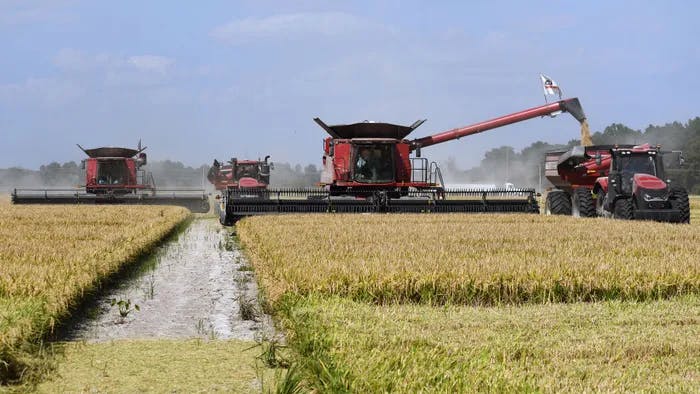Quality Rice Seed and Stewardship of Technology
By Whitney Haigwood, Delta FarmPress
October 20, 2023
At a Glance
- Zack Tanner and his family have produced rice seed for Horizon Ag since the early 2000s.
- In 2023, he grew Clearfield CLL18 and new varieties, Clearfield CLL19 and Provisia PVL04.
- Stewardship of this weed control technology is essential to its continued effectiveness.
Rice production takes ample management, and that is certainly the case for Zack Tanner and his family in the bootheel of Missouri. Tanner Seed Company serves as a pivotal point between the rice breeder and the broader market. They have produced rice seed on their operation for Horizon Ag since the early 2000s, with rice crops that yield parent seed to be sold and planted in upcoming production seasons.
This year, Tanner grew and harvested two of the newest Clearfield and Provisia varieties expected to debut on the 2024 market. Clearfield variety CLL19 and Provisia variety PVL04 will expand Horizon Ag’s portfolio, known for proven performance and alternate modes of action against herbicide resistant weedy rice.

Harvest of Clearfield CLL18 parent seed by Tanner Seed Company in Bernie, Mo. WHITNEY HAIGWOOD
Recently, Farm Press attended a Horizon Ag Field Day in Harrisburg, Ark., to learn from specialists, researchers, and producers about these new varieties. Tanner was amongst the presenters and invited Farm Press to his operation in the north Mississippi Delta to see the progress of his rice crop.
Pristine fields on Tanner’s farm serve as evidence of his commitment to rice production and bringing quality seed to market. By the same token, farmers and consultants are encouraged to practice good stewardship to help keep this technology around for the long haul.
Parent Rice Production
The Tanner family has been in the rice seed business since the 1970s, specializing in parent seed production since 2008. Clean fields are crucial to quality seed production, which makes management a bit more intense on Tanner’s operation.
“We only produce rice seed on our farm. We must maintain a very clean atmosphere throughout the growing season so we can see if there are any negative off types in our seed,” Tanner said.
The season begins by blocking drill openers at planting. This creates an unplanted lane every 20 feet through the rice field and makes it easier for the roguing crew to walk the fields later in the season.
“Since we produce registered seed, we physically walk every seed acre to remove any off types. The lanes help to guide us through the field,” he explained.
This process begins July 4 and continues through late August, just before the fields are drained. Since Tanner does not plant the levees for seed, he removes them completely for quick and easy draining.
“Tearing the levees down completely is kind of the silver lining in not getting to plant them. They are gone at harvest and the combines can go where they need to go,” Tanner said.
From there, harvested rice seed is taken to the seed company where it is dried, cleaned, and conditioned for the upcoming production season.
Tanner noted that another silver lining in rice seed production is getting firsthand experience with the new varieties. This year he grew Provisia PVL04 and Clearfield varieties CLL18 and CLL19, which all look fantastic.
For a closer look at these varieties on Tanner's operation, you can check out this Farm Press slide show, Variety Spotlight: Clearfield and Provisia rice.
Technology Stewardship
The topic of stewarding these technologies surfaced during a presentation by Jason Norsworthy, distinguished professor of weed science at the Arkansas Division of Ag. While Provisia and Clearfield varieties are excellent for weed control, Norsworthy cautioned about the need to preserve the integrity of the technology.
“The Provisia Rice System is all we are going to have for the next few years to control the weedy rice and resistant red rice issues that are costing farmers significant production and profit potential year after year. We have good Provisia varieties that perform consistently, and we must steward and protect this technology, so it is around for years to come,” Norsworthy said.
One stewardship recommendation is the move from a two-pass herbicide system to a three-pass system. Norsworthy suggested 10 fluid ounces at the 2-leaf growth stage, 10 fluid ounces at the 5-leaf growth stage, and finally, a post-flood application to reduce the risk of weedy rice coming to seed and outcrossing.
Crop rotation is another management practice to preserve both the Provisia and Clearfield technologies; because consecutive planting of one or both, year after year, can lead to herbicide resistance.
The Provisia Working Group will finalize its revised BMPs in the coming weeks and share those recommendations with farmers and the industry during winter meetings ahead of the 2024 season.
